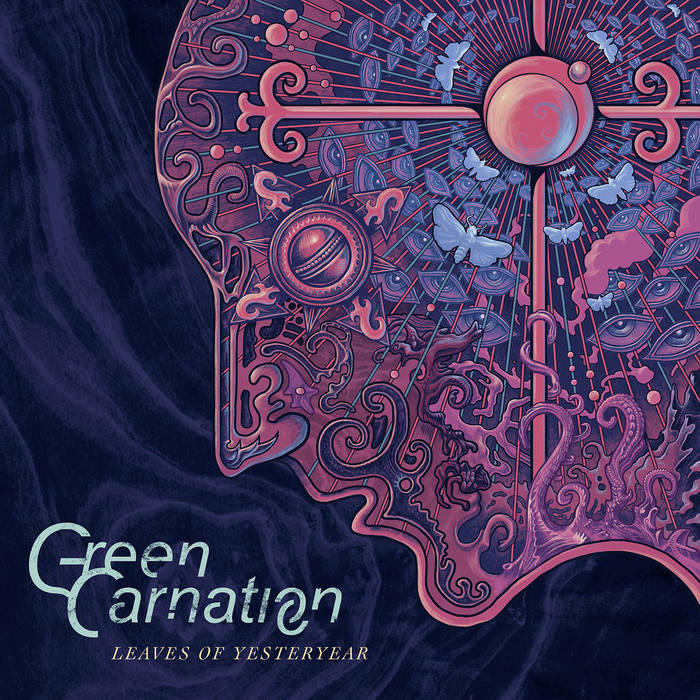
Hailing from Norway, Green Carnation have made uneven progress over the years, founding member Tchort’s stints in Emperor, Satyricon and Einherjer threatening to strangle the band in the crib before a single album could be released. However, reassessment of the band’s potential in 2000 resulted in the release of debut album A Journey To The End Of The Night, rapidly followed by acclaimed sophomore effort Light Of Day, Day Of Darkness. The band remained active throughout the early 00s, releasing two more albums, a stripped-down acoustic set and an astonishing live DVD, before splitting in 2007. It would be nearly ten years before the band would reunite, and a further three, before a new album would be announced. However, 2019 saw Green Carnation enter the studio alongside Endre Kirkesola (Abbath, in Vain) for Leaves Of yesteryear, a five track record that pays tribute to the band’s storied past (not least via a corrosive cover of Sabbath’s Solitude, whilst hinting at what is yet to come.
Opening proceedings, the title track sees the band heading off along similar tangents to Ulver. Still possessed of a love for the riff (of the mighty, doom-laden kind), but possessed of a surfeit of melody, thanks to Kenneth Silden’s Oldfield-esque keyboards, Leaves Of yesteryear is an achingly brilliant piece of music that ebbs and flows across its expanded runtime. The sense of yearning in Kjetil Nordhus’ vocals and the sweeping grandeur of the guitars serve to draw the listener into another world, something very much helped by Endre’s skills behind the desk. It stands as a remarkable album opener, the band conjuring up a dense, metallic storm as they edge towards its conclusion. Then, like a dash of cold water to the face, the surging power of Sentinels is upon you, the sanguine bass of Stein Roger Sordal seeking to lull the listener into a false sense of security before Jonathan Alejandro Perez’s innovative work behind the drum kit sends the track spiralling off in new and unexpected directions. Beautifully rendered and deeply compelling, there’s a sense here, reminiscent of hearing Opeth for the first time, that you’re listening to a piece of music that has been lovingly developed by the band, and it’s impossible not to be carried along by their obvious love for their music.
Nothing, however, can prepare the listener for what comes next. At fifteen minutes, My Dark Reflections Of Life And Death simply towers over the rest of the album but, despite it’s lengthy run time, it’s a track that makes such perfect use of each and every element at its disposal that it passes in the blink of an eye. Form the mesmerising opening, which seems to slowly rise out of the dark, via rippling, echo-drenched lead guitar and somnolent keyboards, it suddenly bursts into life, drawing together threads from doom, progressive rock and classic heavy metal with a skill that makes it appear easy. Few bands can juggle genres with such effortlessness, and the results are astonishing. Bravely, the band follow it up with another lengthy song, the ten-minute Hounds, yet it speaks to their skill that they manage to so do without compromising the overall flow of the album. A subtle, slow-building piece, Hounds opens on a is gently reflective note, Kjetil’s haunted vocals floating at the heart of the mix, like a memory drifting within an isolation chamber. When the band do kick in (and with considerable presence and power), it drives the song in a darkly progressive direction; as if Candlemass were covering Flying Colours, and the band once again justify the run time with a sense of adventure that is utterly beguiling.
It leaves the band’s cover of Solitude to see things out. In the normal run of things, I’d question a band’s decision to end on a cover, but this is no mere afterthought, and the band turn in a brilliant rendition of a track that obviously influenced them during their formative years. It’s a rare example of a band so utterly inhabiting a track written by someone else, that it becomes their own in the process, and it brings the album to a flawless end.
Leaves Of yesteryear is a masterpiece. An absolute gem that seems to bring time and space to a standstill for forty sumptuous minutes, it’s beautifully played and recorded, with not a moment that threatens to draw the listener out of their reverie. This is music for the soul, played by a band utterly enraptured by their own art. Simply wonderful. 10/10



